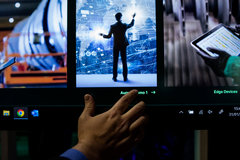Baker Hughes Chief HR Officer, Deanna Jones, joined Dan Brennan, VP of BakerHughesC3.ai, and Shan Jegatheeswaran, VP of digital for oilfield services, with experts from Heidrick Consulting for a discussion about talent and digital transformation post-COVID-19.
The impact of the global COVID-19 pandemic has changed the ways in which leaders in the energy industry think and operate when it comes to human capital. Leaders are balancing the immediate need for safe and efficient operations, with accelerating technology innovation and adoption, shifts to remote operations, and a focus on the energy transition. Having the right talent means having a workforce that has the skills and willingness to adopt new ways of working.
Heidrick Consulting, developed scenario planning models based on economic and social factors that will impact potential futures beyond 2020. Their team recently joined Baker Hughes for a webinar about the role digital technology will play in the energy industry, and the importance of leaders prioritizing talent and leadership equipped with digital skills. Here are a few takeaways from their discussion.
We are now ready for the next stage: let’s reimagine the future
“Our immediate response to COVID-19 was about: what is essential work and how do we keep employees safe?” Jones said. “Over time, we pivoted the crisis management teams to consider what we are learning in this moment and how we can define the future within Baker Hughes. How can we accelerate our ability to do work remotely for much more of our workforce? What would actually have to be true, what do we have to have in place? The future of work is this continued evolution and reimagining.”
''How can we accelerate our ability to do work remotely for much more of our workforce?''
Deanna Jones, CHRO, Baker Hughes
“We’re seeing in every industry this pattern between digital haves and have nots. Some companies grasped digital as an opportunity to reimagine and rethink and actually see it as an engine to transform different parts of their business,” said Raj Ramachandran, senior partner at Heidrick Consulting. ‘’They are better positioned when they think of the role talent will play in these new futures’’, he added. “There is a huge opportunity for oil and gas to reimagine how they deliver services today and in a digital world. Now there is no better time to push the pedal on that.”
It starts with empathy and trust
“Empathy is a common theme,” said Brennan. “Whether you’re building and deploying digital technology or supporting a globally diverse organization to be productive and safe, showing empathy translates into social trust. As we have seen in the scenario planning, the technology-enabled future we want to be part of requires high degrees of social trust.”
“Empathy is a common theme”
Dan Brennan, VP of BakerHughesC3.ai
“The outcome of what we’re building is a reflection of our team,” said Jegatheeswaran. “When there is trust, it’s fun and you’re moving forward fast and with quality, so the outcome is good. Diversity of talent is another big factor. We’re bringing in experts in software, those who have oil and gas expertise, but also talent from big pharma, banking and B2C tech companies. We really are tackling some of humanity’s largest challenges with digital, and it takes a strong team to get it done.”
Collaboration: critical to digital success
“Our values as a company and how we navigate these uncertainties lead me to think a lot about collaboration,” Jones said. “Collaboration in a physical environment is easier, so we worry about losing that. But instead, we found our employees excited that globally we were all on a level playing field – it didn’t matter if you were in headquarters, in a manufacturing facility or a rig-based employee – we are all on Microsoft Teams. We all have the same access. That was a really powerful lesson as we learnt to connect and collaborate in new ways.”
“Companies create outposts around digital and data that aren’t accessible by the rest of the enterprise, and they become chokepoints,” says Scott Snyder, who coauthored the Heidrick Consulting paper on scenario planning. “Sometimes you need those groups to jumpstart the art of the possible, but you also need to ensure every function and business line has access to them. If set up the right way, collaboration should happen easily. And standards should be set across the company. Each group with the ability to innovate with speed around those digital assets instead of relying on support from those core groups each time.”
Build competencies, then bring it back to your team
''Leaders must take ownership of their digital education”
Shan Jegatheeswaran, VP of digital for oilfield services, Baker Hughes
“Leaders must take ownership of their digital education,” said Jegatheeswaran. “If we wait for the perspective on how to move forward digitally, we have missed the opportunity. If you are a digital budget decision maker, these competencies are required for any future we have coming in this industry.’’
“Digital skills are capabilities everyone has to have,” Jones adds. “No one in our teams doesn’t touch a data model and doesn’t need to understand data management and how that has an implication for the entire organization. I know this industry is resistant to change sometimes. I feel strongly that our future as an energy technology company will require true embodiment of our values – grow, lead, collaborate, and care to make this work.”
Energy Forward Stories
Sign up to stay up to date on the latest innovations and people shaping the future of our industry.




